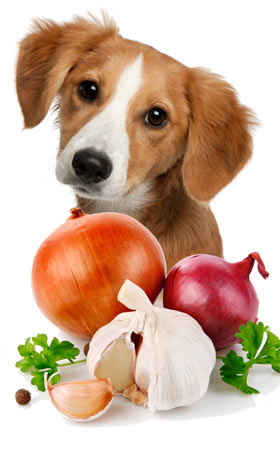Jan 6th 2019
Are Onions and Garlic Bad For Your Dog?

by Caitlin Ultimo
Garlic and onions may be ingredient staples of your favorite dishes—even some dishes that you share with your dog. But you should think twice before letting your pet lick up the rest of your garlic and onion-based broth from your homemade chicken soup.
“Humans may love the flavors of garlic and onion to spice up their food,” says Susan Konecny, RN, DVM and medical director of Best Friends Animal Society®, “but giving garlic and onions to your pet can cause health problems. In severe cases, it could even kill your pet.”
Why are Onions and Garlic Bad for Dogs?
"Any member of the Allium family—onions, garlic, leeks, and chives are the most common reported to cause toxicity—contains N-propyl disulfide,” says Dr. Ann Hohenhaus, staff doctor at NYC's Animal Medical Center. “This compound damages the oxygen-carrying substance found in red blood cells called hemoglobin.”
This kind of damage can cause red cells to rupture and be cleared from circulation faster than normal. This condition, hemolysis, results in anemia and red or brown urine. “In severe cases, the anemia may lead to internal organ damage, organ failure, or even death,” says Konecny. If your pet has eaten any garlic or onions he or she may also experience gastrointestinal irritation.
How Much Garlic or Onion is Toxic to Dogs?
"Consumption of as little as 15 to 30 g/kg in dogs has resulted in clinically important hematologic changes,” says Hohenhaus. “Onion toxicities are consistently noted in animals that ingest more than 0.5% of their body weight in onions at one time.” So, think that one fourth of a cup can make a 20-pound dog sick. Toxicity can occur whether the products are fresh, cooked, or in a dried/powdered form such as in spices. Onions and garlic can also cause anemia when smaller amounts are eaten over a long period of time.
In addition, consuming juice, dietary supplements, or food preparations derived from or containing Allium species can also be potentially toxic to dogs and cats. “They can be fried (as in onion rings), dehydrated (as in soup), or prepared in some other tasty form, such as sautéed with mushrooms or hidden in a soufflé,” warns Konecny.
Next: What are the Symptoms of Onion and Garlic Poisoning in Dogs, and What Should You Do?
What are the Symptoms of Onion and Garlic Poisoning in Dogs?
Clinical signs of toxicity from Allium species—including garlic and onions—may appear within one day of consumption if large amounts of material have been ingested.
“However,” adds Konecny, “it is more common for clinical signs to develop after a lag of several days.”
Signs to look out for include:
- Lethargy
- Weakness
- Ataxia (lack of coordination)
- Pale gums
- Vomiting and/or diarrhea
- Increased heart and/or respiratory rate
- Red or brown discolored urine
- Hyper-salivation
What Should You Do If Your Dog Eats Garlic or Onion?
Contact your veterinarian or emergency clinic as soon as you identify ingestion of onions and/or garlic—or any of the Allium species of plant or herbs, for that matter.
“The diagnosis is generally made through a combination of your pet’s history and clinical signs, and (later) microscopic confirmation of a type of anemia called Heinz body-type hemolytic anemia,” says Konecny.
“Treatment should be immediate and follow the principles of decontamination, often including administration of intravenous fluids (to maintain hydration and for diuresis to “flush” the bloodstream and kidneys), induction of vomiting or gastric lavage (to remove the toxic agent if ingested within the last 2 hours), administration of activated charcoal (to absorb toxins), and possibly a cathartic (drug to cause increased excretion of a toxin),” she explains.
In severe cases, oxygen therapy and a blood transfusion may also be required. The outlook is generally good with early and aggressive treatment, but may not be as effective in severe cases or in pets that were not immediately treated by a veterinarian.
How Can You Protect Your Dog From Garlic and Onion Poisoning?
Try to avoid exposure of onions and garlic in any form to best prevent your dog from becoming ill. "Don't serve food from your plate containing onions or garlic and don't serve prepared human foods without checking the label,” says Hohenhaus. “And keep the trash covered to prevent your dog from eating the discarded onions from the Sunday roast or any onion scraps from cooking beef stew."
This article was verified and edited for accuracy by Dr. Jennifer Coates, DVM
